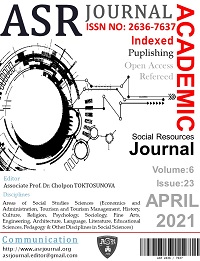ÖĞRETMENLERİN ETİK DIŞI DAVRANIŞLARININ OKUL İKLİMİNE ETKİLERİNE YÖNELİK OKUL YÖNETİCİLERİNİN GÖRÜŞLERİ
Author :
Abstract
Her meslekte olduğu gibi öğretmenlik mesleğinde de öğretmenlik mesleğinin özüne uygun olarak geliştirilmiş bazı etik kodlar ve etik ilkeler bulunmaktadır. Fakat bu etik kodların ve etik ilkelerin korunması her zaman mümkün olmamakta, bazı öğretmenler bilerek veya farkında olmadan etik dışı davranışlar gösterebilmektedir. Bu çalışmada Niğde ilindeki okul yöneticilerinin bakış açılarına göre; etik kavramının tanımı, öğretmenlerin okul iklimini etkileyen etik dışı davranışlarının hangileri olduğu, bu etik dışı davranışların okul iklimine yönelik etkileri, öğretmenleri etik dışı davranış göstermeye iten sebepler ve bu davranışların önlenmesine yönelik görüşler araştırılmıştır. Çalışma nitel araştırma yöntemiyle gerçekleştirilmiş olup, maksimum örnekleme tekniği kullanılarak çalışma grubu oluşturulmuştur. Buna göre çalışmada ilkokul, ortaokul ve liselerde görev yapan, farklı alanlara ve farklı mesleki deneyimlere sahip 30-50 yaş aralığındaki müdür ve müdür yardımcıları ile görüşmeler gerçekleştirilmiştir. Elde edilen veriler betimsel analiz tekniğiyle analiz edilerek tablolaştırılmıştır. Çalışma sonucunda öğretmenlerde etik dışı davranışlarla ilgili diğer çalışmalarla benzer bazı sonuçlara ulaşılmakla birlikte bir takım farklı sonuçlara da ulaşılmıştır. Öğretmenlerin etik dışı davranışlarının okul iklimine etkileri öğrenciler, öğretmenler ve okul çevre ilişkisi açısından incelenmiştir.
Keywords
Abstract
As in any profession, there are some ethical codes and ethical principles developed in accordance with the essence of the teaching profession in the teaching profession. However, it is not always possible to protect these ethical codes and ethical principles, and some teachers may knowingly or unwittingly exhibit unethical behavior. In this study, the definition of the concept of ethics, the unethical behaviors of teachers affecting the school climate, the effects of these unethical behaviors on the school climate, the reasons that motivate teachers to act unethically and the opinions on the prevention of these behaviors were investigated according to the perspectives of school administrators in Niğde province. The study was carried out with qualitative research method and the study group was formed by using the maximum sampling technique. Accordingly, in the study, interviews were conducted with principals and assistant principals in the age range of 30-50 years who work in primary, secondary and high schools and have different fields and different professional experiences. The obtained data were analyzed and tabulated using descriptive analysis technique. As a result of the study, some similar results were reached with other studies related to unethical behavior in teachers, but a number of different results were also reached. The effects of teachers' unethical behavior on school climate were examined in terms of students, teachers and the school environment relationship.
Keywords
- Aydın, İ. (2012). Eğitim ve Öğretimde Etik. (3. Baskı) Ankara: Pegem Akademi Yay.
- Aydın, İ. (2012). Eğitim ve Öğretimde Etik. (3. Baskı) Ankara: Pegem Akademi Yay.
- Brass, D. J., Butterfield, K. D., & Skaggs, B. C. (1998). Relationships and unethical behavior: A social network perspective. Academy of Management Review, 23 (1), 14-31
- Creswell, J. W. (2002). Educational research: planning, conducting, and evaluating quantitative Dand, qualitative research. Upper Saddle Creek, NJ: Pearson Education
- Creswell, J.W. (2015). Nitel araştırma yöntemleri: Beş yaklaşıma göre nitel araştırma ve araştırma deseni (4. baskı). Ankara: Siyasal Kitapevi.
- Çalışlar, A. (1983). Ansiklopedik Kültür Sözlüğü. İstanbul: Altın Kitaplar Yayınevi.
- Çelik, V. (2005). Liderlik. İçinde, Y. Özden (Ed.). Eğitim ve okul yöneticiliği el kitabı (ss.187-215). Ankara: Pegem Akademi.
- Çetin, S.K. VE Demirkasımoğlu, N. (2015) Öğretmen ve Yöneticilerin Etik ve Etik Dışı Davranışlarının Basına Yansımaları. Sosyal ve Beşerî İlimler Araştırmaları Dergisi (ss.101)
- Ekiz, D. (2003). Eğitimde Araştırma Yöntem ve Metotlarına Giriş. Ankara: Anı Yayıncılık.Gözütok, F. D. (1999). “Öğretmenlerin etik davranışları”. Ankara Üniversitesi Eğitim Bilimleri Fakültesi Dergisi, 32 (1): 83-99
- İnal, Kemal. (1996). "Sosyalist Etik". Gelecek. 1-3, Kasım- Aralık Kuçuradi, I. (1988). Etik, Ankara: Meteksan Yayınları.
- Kuzu, A., (2013) Bilimsel Araştırma Yöntemleri (Ed. Prof. Dr. Adile Aşkım KURT) Anadolu Üniversitesi. Eskişehir
- Özdevecioğlu, M. VE Aksoy, M. S. (2005). Organizasyonlarda sabotaj: Türleri, amaçları, hedefleri ve yönetimi. Cumhuriyet Üniversitesi İktisadi ve İdari Bilimler Dergisi, 6 (1), 95-109.
- Pelit, E. Ve Güçer, E. (2006) Öğretmen adaylarının öğretmenlik mesleğiyle ilgili etik olmayan davranışlarave öğretmenleri etik olmayan davranışa yönelten faktörlere ilişkin algılamaları. Ticaret ve Turizm Eğitim Fakültesi Dergisi, 2, 95-119
- Platton, M.Q. (2002). Qualitative researcb and evaluation medhots (3rd edition). Thousand Oaks: Sage Publications.
- Rosenblatt, Z., & Peled, D. (2002). School ethical climate and parental involvement. Journal of Educational Administration, 40, 349-367.
- Tepe H. (2000). Basın Etiği ya da Basının Etik Sorunları Üzerine, Harun Tepe (ed.), Etik ve Meslek Etikleri, Türkiye Felsefe Kurumu, Ankara, 121-136.
- Verhoeven, J. C., Aelterman, A., Rots, I, Buvens, I. (2006) Public Perceptions Of Teachers Status İn Flanders. Teachers And Teaching: Theory And Practice, 12 (4), 479-500, DOI:
- Yıldırım, A. & Şımşek, H. (2011). Sosyal Bilimlerde Nitel Araştırma Yöntemleri (8.Baski). Ankara: Seçkin Yayıncılık.
- Yılmaz Ve Altınkurt (2011) Mehmet Akif Ersoy Üniversitesi Eğitim Fakültesi Dergisi, Yıl 11, Sayı 22, Aralık 2011, 113- 128
- Yılmaz, K. VE Altınkurt, Y. (2009). Öğretmen adaylarının mesleki etik dışı davranışlar ile ilgili görüşleri. İş Ahlakı Dergisi, 2(2), 71–88.
- https://www.milliyet.com.tr/gundem/okulda-skandal-goruntu-o-ogretmen-aciga-alindi-6105337 http://personel.meb.gov.tr/meb_iys_dosyalar/2016_06/02032141_mesleki_etik_ilkeler.pdf





